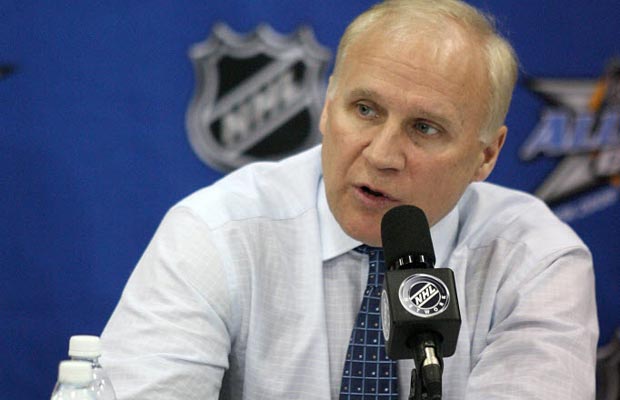Players Association Must Take More Responsibility
The NHL has a chance to do things a little differently, now. If they so choose.
With the announcement that chief disciplinarian Colin Campbell is stepping down from that portion of his duties (he’ll apparently stay on with the league as Senior Vice President of Hockey Operations), the league can choose this decision as a catalyst towards something completely different, when it comes to player suspensions and fines.
I’ll suggest something radical: Get out of the suspension and fine business almost entirely.
It’s not that I advocate a frontier mentality in the NHL. Far from it. It’s just that I believe the most effective way for players to police themselves and dole out appropriate punishment is to have their own association do it for them. It seems to me that, over the years, the NHLPA has exerted an enormous amount of time, energy, and other resources, to protect the rights of players being penalized by the league’s head office. That’s laudable, but flawed.
The players’ association should be in the business of protecting ALL players. Not just from the big bad wolves on the Board of Governors, but also from themselves. In every disciplinary scenario that’s played out over the life of the NHLPA, the union has represented the offender to the hilt, with little or no consideration given to the injured player who suffered the brunt of the action that landed the offending player on the carpet in the first place. Arguments have been made with the goal of ensuring the offender misses as little action as possible, loses as little money as possible. That would constantly leave the injured player with not much of a voice at all, as league officials acted in the best interests of the game only. The GAME only.
Imagine a hockey world where supplemental discipline was triggered by league officials but then handed over to the Players’ Association to mete out punishment. This would still give the league a voice when it comes to incidents it deemed harmful to the game. They deserve some, after all. But the NHL, throughout its history, has shown very little stomach for a fight with the NHLPA, when it comes to increasing the length of suspensions, and the value of fines. That’s at least partly because of the NHLPA’s antagonistic stance against all things management – related.
So. We take the final decisions on suspensions and fines out of the league’s hands, and hand it to the Players’ Association. The Association is forced (or would be, in an amended players constitution) to consider the (about to be) suspended player’s rights as well as the rights of the victimized player. That player would have a voice in the proceedings as well. If you think about it, that’s not so radical in the real world, just the NHL’s. In most unions, if you have a serious problem in the workplace with a fellow employee, you can file a grievance and have that grievance heard by the union. And the other employee, equally, would have a chance to defend that grievance.
That kind of equal representation is conspicuously absent, in the National Hockey League. Oh, the NHLPA will pay lip service to the needs of a player sitting at home in a darkened room, trying to remember what day it is. They’ll tsk tsk about the situation and publicly decry the action that put that player in a concussed state, but they won’t actually do anything about it. No, they’ll save their sweat and muscle for the suits in New York who have the temerity to suggest a two game suspension. Give the victimized player a real voice in the proceedings, with real representation exerting real pressure, and I think you have a real chance at stiffer suspensions. That’s because the NHLPA would have to do everything in its power to ensure all players involved would be treated accordingly.
This can’t happen unilaterally, I know. For now, things will continue they way they have, just with a new NHL judge (Brendan Shanahan) wielding the gavel. But, it’s the perfect time to start the dialogue that can lead to improvement of the quality of pro hockey justice, when the next collective bargaining agreement is ratified.
Click to see: [box border=”full”]Gary Bettman’s Winnipeg Remarks Translated[/box]
